Infrastructure Space uses large territories and novel mapping techniques to explore them, to reveal latent environmental, social and cultural conditions. We approach space with neutrality to form objective views of the ways in which space is produced and used. Expanding on theories of landscape urbanism, we recognise that it is difficult to separate urban scale from global scale. Thus, infrastructure as a methodological lens enables critical discourse that addresses global issues of exchange, mobility and justice. This year we asked all of our students to consider the following:
COMMONS. By this we mean a shared space that enables a citizen led agency, sometimes to fill what has been referred to as an ‘infrastructural gap’.
ECO-SYSTEMS. We deliberately hyphenate this term to accentuate its constituency - ecological / systems - we are interested in systems that can enable ecological diversity and sustainability.
SOCIETY. Society has manifold interpretations. Here we refer to groups of people with common values, territory and cultural expectations and the positive effects of such arrangements.
BA3 were charged with developing ideas for a future service station and asked to consider carbon reduction, electric vehicles, minimisation of travel, material cultures and social sustainability. In so doing, projects from multimodal transport hubs, to power generation centres, explored how service stations are pivotal to achieving significant carbon reduction; revealing that services need to be more than an amenity to humans, but should be considered as part of wider social, sustainable and ecological systems.


